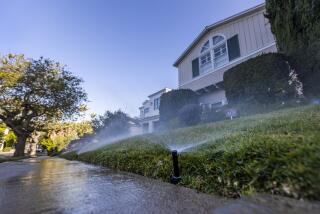Mandatory Cut in Water Use Is Sought : Drought: County agencies will be asked to order their customers to place restrictions on some activities.
- Share via
With the threat of drought spreading throughout Southern California this spring and summer, the San Diego County Water Authority plans to ask its 24-member agencies to curtail consumption by up to 10% by imposing tough restrictions on such activities as watering lawns and washing cars.
At its meeting Thursday afternoon, the Water Authority’s staff plans to recommend to its board of directors that it ask the various cities and water agencies throughout the county to enforce mandatory restrictions.
Water Authority spokesman Mark Stadler said Tuesday that the Water Authority lacks the authority to enforce the cutbacks or the rules against misusing water.
“Our board can only recommend to the 24 member agencies that they impose mandatory water restrictions,” he said. “It is up to the member agencies to impose and enforce the regulations.”
Although San Diego County is in its fourth year of a drought, the mandatory conservation measures under a so-called Stage 2 water alert are not needed to ensure a sufficient supply of water over the coming summer, Stadler said.
Nevertheless, Stadler said, the authority is concerned that water supplies could dwindle if more people in the county fail to cut back.
“In order to meet the total demand this summer (without water use cutbacks), we would have to dip deeply into our local storage reservoirs,” he said. “This would make us very vulnerable if the drought should continue into future years.”
This is the first time that the Water Authority has recommended mandatory water conservation measures. Past voluntary conservation appeals have failed to meet the goal of a 10% reduction in water usage, Stadler said. Only in 1976-77, when a statewide drought was at its worst, did San Diego County residents heed the call to reach a 15% cut in water usage.
In Ramona, the Municipal Water District has been plagued with an aging and inadequate water distribution system and last May imposed Stage 2 restrictions on its customers. The system is working well, Ramona water district officials say, with only a few water-wasters facing court dates and fines of up to $600.
For the average citizen, the restrictions being pushed by the County Water Authority would mean doing a lot of water work at night, usually on an every-other-day cycle based on house address numbers.
Property owners could do limited watering at any time, but only by using drip irrigation, a hand-held bucket or a hand-held hose with an automatic shut-off trigger. Car-washing also could be done at any time if a bucket or a hand-held hose with automatic shut-off is used.
Ornamental fountains would be shut off unless given a reprieve by the local water agency. Restaurants would not serve water to diners except upon request.
It’s not the drinking water that strains the drought-plagued water system, Stadler said, it’s the four times as much water that it takes for washing the glass.
Watering of large turfed areas, such as golf courses or athletic fields, is restricted to night hours, except for golf greens, which are exempt.
Fire hydrants would be used only for fire-fighting, construction purposes and other health and safety needs.
Washing down of paved or cemented areas is a violation of Stage 2 restrictions, “except to alleviate immediate fire danger,” according to the regulations. There may be other limits imposed, such as every-other-day watering or car-washing restrictions based upon a user’s address, Stadler explained.
Irrigation systems, for all but commercial growers, could only be used between 6 p.m. and 6 a.m. on permitted days. Filling of swimming pools, spas, ponds or artificial lakes also are restricted to the same night hours and date restrictions.
Stage 2 restrictions do not apply to commercial agriculture or to businesses such as car washes, Stadler said. Users of reclaimed water also are exempt.
Only if water cut-offs to commercial or industrial users were imminent or a major disaster had occurred would further, more restrictive rationing be imposed. Stage 4, the ultimate mandatory rationing level, would ban all irrigation, car-washing, swimming pool or spa water use and, worst of all, would cut off all use of water in air-conditioning.
More to Read
Sign up for Essential California
The most important California stories and recommendations in your inbox every morning.
You may occasionally receive promotional content from the Los Angeles Times.













